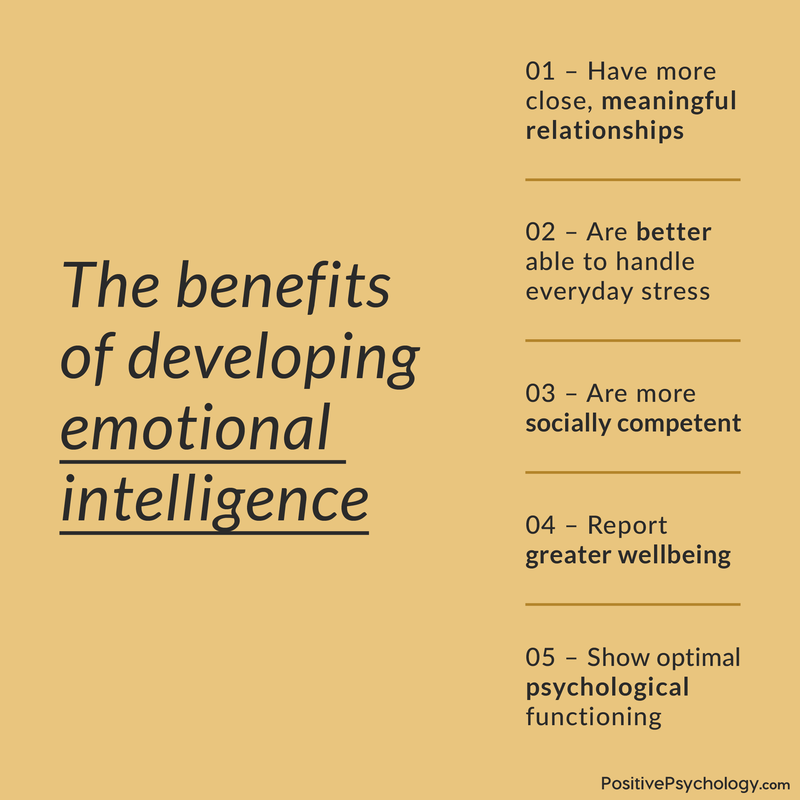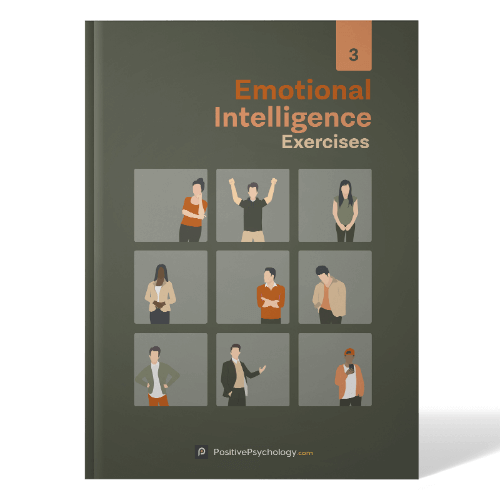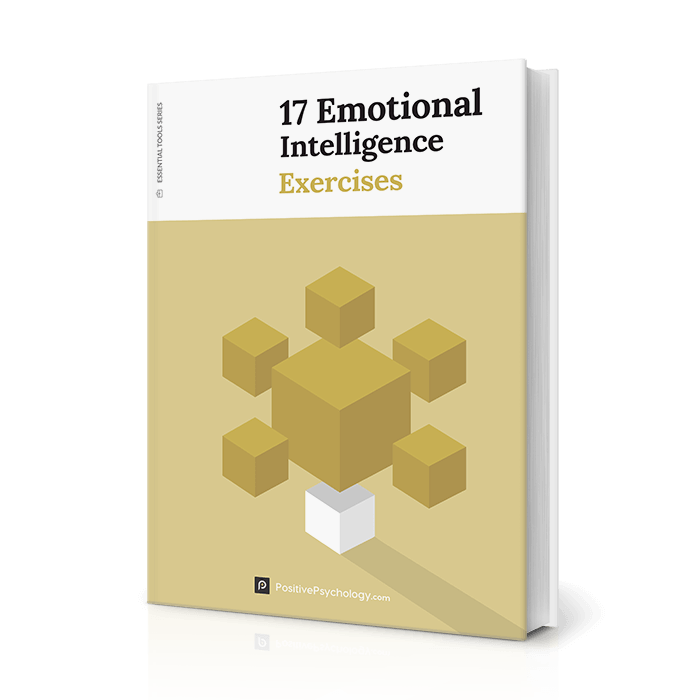The Importance of Emotional Intelligence (Incl. Quotes)
 Do you recognize the emotion you are feeling?
Do you recognize the emotion you are feeling?
Can you manage those feelings without allowing them to swamp you?
Can you motivate yourself to get jobs done? Do you sense the emotions of others and respond effectively?
If you answered yes to these questions, it is likely that you have developed some or all of the skills that form the basis of emotional intelligence.
Emotional intelligence (EI) forms the juncture at which cognition and emotion meet, it facilitates our capacity for resilience, motivation, empathy, reasoning, stress management, communication, and our ability to read and navigate a plethora of social situations and conflicts. EI matters and if cultivated affords one the opportunity to realize a more fulfilled and happy life.
Before you read on, we thought you might like to download our three Emotional Intelligence Exercises for free. These science-based exercises will not only enhance your ability to understand and work with your emotions but will also give you the tools to foster the emotional intelligence of your clients, students or employees.
This Article Contains:
- What is the Importance of Emotional Intelligence?
- Five Categories of Emotional Intelligence (EI/EQ)
- Value and Benefits of Emotional Intelligence
- Self Management, Self Regulation, and EQ
- Resilience and EQ
- Does Emotional Intelligence Matter More Than IQ?
- Is There a Link Between EI and Job Performance?
- How about Emotional Intelligence and Motivation?
- Using Emotional Intelligence to Deal With Stress
- Linking EI and Decision-Making
- Can Emotional Intelligence and Success Be Related?
- Goals and EI
- How EQ Affects Communication
- Why Emotional Intelligence Matters For Happiness
- 6 Youtube Videos and TED Talks on Emotional Intelligence
- 21 Quotes on the Value of Emotional Intelligence
- A Take-Home Message
- References
What is the Importance of Emotional Intelligence?
The term ‘Emotional Intelligence’, first coined by psychologists Mayer and Salovey (1990), refers to one’s capacity to perceive, process and regulate emotional information accurately and effectively, both within oneself and in others and to use this information to guide one’s thinking and actions and to influence those of others.
Emotional intelligence can lead us on the path to a fulfilled and happy life by providing a framework through which to apply standards of intelligence to emotional responses and understand that these responses may be logically consistent or inconsistent with particular beliefs about emotion.
As the workplace evolves, so too does the body of research supporting that individuals (from interns to managers) with higher EI are better equipped to work cohesively within teams, deal with change more effectively, and manage stress – thus enabling them to more efficiently pursue business objectives.
Goleman (1995) recognized five distinct categories of skills which form the key characteristics of EI and proposed that, unlike one’s intelligence quotient (IQ), these categorical skills can be learned where absent and improved upon where present.
Thus, EI, unlike its relatively fixed cousin, IQ, is instead a dynamic aspect of one’s psyche and includes behavioral traits that, when worked upon, can yield significant benefits, from personal happiness and wellbeing to elevated success in a professional context.
Five Categories of Emotional Intelligence (EI/EQ)
Self-awareness is the first step toward introspective self-evaluation and enables one to identify behavioral and emotional aspects of our psychological makeup which we can then target for change.
Emotional self-awareness is also about recognizing what motivates you and, in turn, what brings you fulfillment.
- Self-regulation: the ability to manage one’s negative or disruptive emotions, and to adapt to changes in circumstance. Those who are skilled in self-regulation excel in managing conflict, adapt well to change and are more likely to take responsibility.
- Motivation: the ability to self-motivate, with a focus on achieving internal or self-gratification as opposed to external praise or reward. Individuals who are able to motivate themselves in this way have a tendency to be more committed and goal focused.
- Empathy: the ability to recognize and understand how others are feeling and consider those feelings before responding in social situations. Empathy also allows an individual to understand the dynamics that influence relationships, both personal and in the workplace.
- Social skills: the ability to manage the emotions of others through emotional understanding and using this to build rapport and connect with people through skills such as active listening, verbal and nonverbal communication.
- Self-awareness: the ability to recognize and understand one’s own emotions and their impact on others.
Emotional intelligence has been shown to play a meaningful role in academic success, mental and physical health, as well as attainment in professional domains; the findings of Bar-On (1997) suggested that people with higher EI performed better than those with lower EI in life.
In the modern, agile workplace, there is an ever-increasing emphasis from employers on the importance of EI over academic qualifications.
The importance of EI should not go unappreciated; the ability to understand and manage your emotions is the first step in realizing your true potential. How can we achieve meaningful progress if we don’t recognize and acknowledge the point from where we’re starting? When checking directions on your sat-nav, a destination is useless unless we know the origin.
Whether it be connecting with others and improving interpersonal communication, achieving success in the workplace or social relationships, dealing with stress and improving motivation or refining decision-making skills – emotional intelligence plays a central role in realizing success in both personal and professional life.
Value and Benefits of Emotional Intelligence
The value and benefits of emotional intelligence are vast in terms of personal and professional success. It is a core competency in many vocations, can support the advancement towards academic and professional success, improve relationships, and boost communication skills, the list goes on.
Bar-On (1997) goes so far as to suggest that people with higher EI tend to perform better than those with lower EI in life overall, regardless of IQ. There has been much discussion regarding the benefits of teaching EI in schools, with an emphasis on the idea that emotionally intelligent children grow up to become emotionally intelligent adults.
Proficiency in EI is becoming a vital prerequisite in prolonged or intense areas of ‘emotional work’ such as nursing, social work, the service industry, and management roles. High EI improves the physical and psychological health of people and encourages academic and business performance (Bar-On & Parker, 2000).
Emotional intelligence is an integral part of forming and developing meaningful human relationships. Schutte et al (2001) found that, over a series of studies, there were significant links between high EI and more successful interpersonal relations.
Those participants who exhibited higher levels of EI also showed a greater propensity for empathic perspective taking, cooperation with others, developing affectionate and more satisfying relationships as well as greater social skills in general.
So far, we have focused on the social and psychological benefits of EI, it is important to note that self-awareness – the ability to manage emotions and stress – and the ability to solve personal, as well as interpersonal problems, are also significantly related to physical health.
Chronic stress and the prolonged negative effects which accompany it such as anger, depression, and anxiety can precipitate the onset and progression of hypertension, heart problems, and diabetes; increase susceptibility to viruses, and infections; delay healing of wounds and injuries; and exacerbate conditions such as arthritis and atherosclerosis (Bar-On, 2006, Black & Garbutt, 2002).
The value of EI is immense; developing emotional intelligence encourages many positive traits, from resilience to communication, motivation to stress management, all of which can be seen as conducive to effectively achieving personal, physical and occupational health, and success.
Undoubtedly you know how valuable it is to develop your emotional intelligence abilities, but have you ever wondered exactly why?
Research shows there are many benefits for those with high levels of emotional intelligence, including greater resilience, social skills and connection.
But how do you reach a stage where you can reap these benefits? What barriers stand in your way? How can you help your clients, friends, colleagues, students and even your children develop excellent EI skills?
For answers to all these questions and more, check out our Emotional Intelligence Masterclass©.

Self-Management, Self-Regulation, and EQ
While it’s commonly accepted that our emotions are driven by impulses over which we have little-to-no control, we do have the capacity for self-management and self-regulation; the ability to manage – if not control – the resultant emotions and our reactions thereto.
Consider the calm and rational pilot despite the aircraft’s landing gear being jammed or the surgeon who carries on with their duties despite losing a patient.
This form of self-regulation builds on the basis of self-awareness and is an integral part of becoming emotionally intelligent by exercising the capacity to liberate ourselves from impulse-driven reaction (Goleman, 1995).
Self-management builds on this further and allows an individual to use knowledge about their emotions to better manage them in order to self-motivate and to create positive social interactions.
Leaders with an aptitude for self-regulation are far less likely to be aggressively confrontational and make snap decisions. Self-regulation and self-management do not pertain to the absence of anger; rather it’s about remaining in control of your emotions and not allowing your actions to be emotion-driven.
In instances of negative emotions such as anger, EI can help identify what you are feeling and determine the cause of the emotion through reflection and self-analysis allowing one to respond in a rational manner.
Self-regulation is critical in relation to other facets of EI and can be developed from early childhood, adolescence and throughout adulthood. Mastering self-management allows us the opportunity to open the door to the other beneficial aspects of EI while in the absence of self-regulation other competencies, such as effective communication and conflict management, are challenging.
The good news is that it’s never too late to embark on self-management and regulation training; the potential benefits are numerous and should not be underestimated.
The skills enabled through the development of self-regulation can aid success for (but by no means limited to) counselors, psychotherapists, small business owners, managers, and executives.
Those with stronger skills in this area are less likely to become angry or exhibit stress while being more likely to respond calmly to negative environments, harness personal needs in order to achieve goals and remain motivated.
Resilience and EQ
Emotional intelligence is undoubtedly a valuable tool to utilize in the face of adversity; it has the potential to enhance not only leadership abilities and teamwork effectiveness but also personal resilience.
Focusing on the impact of EI on one’s resilience, that is, one’s ability to cope with stressful conditions, research suggests that those who display higher levels of emotional intelligence are less likely to succumb to the negative impacts of stressors.
In the context of a leadership role, one might expect increased responsibility to coincide with elevated potential stressors, highlighting the importance of strong EI for those in leadership or management positions.
An investigation into the relationship between emotional intelligence and the stress process found that participants who displayed higher levels of EI were less likely to be negatively impacted by the presence of stressors.
Participants completed an ability-based test of EI before rating the subjectively perceived threat level posed by two stressors, they then self-reported their emotional reaction to said stressors and were also subjected to physiological stress-response tests in order to assess their response.
In summary, the findings suggested that “EI facets were related to lower threat appraisals, more modest declines in positive affect, less negative affect and challenge physiological responses to stress… This study provides predictive validity that EI facilitates stress resilience,” (Schneider, Lyons & Khazon, 2013, pp 909).
Further research suggested a link between higher emotional intelligence, resilience and the propensity for depressive behaviors. In an examination of medical professionals – an occupation with a relatively high ‘burnout’ rate – Olson & Matan (2015) found a positive correlation between EI and resilience as well as a negative correlation between resilience, mindfulness, and self-compassion with the ‘burnout’ rate.
In a nutshell, those with higher levels of emotional intelligence also displayed greater resilience and were less likely to ‘burnout’ or succumb to depression.
These results build on previous research which found EI scores were positively correlated with psychological wellbeing while being negatively correlated with depression and burnout. Given the dynamic nature of EI, the study highlighted the potential ability to reduce one’s susceptibility to depression by way of interventions to increase EI (Lin, Liebert, Tran, Lau, & Salles 2016).
Interestingly, EI is strongly correlated with individual advancement and performance, with evidence suggesting a significant link between one’s resilience and one’s motivation to achieve (Magnano, Craparo & Paolillo, 2016).
Furthermore, it is suggested that resilience plays a mediational role between EI and self-motivated achievement. In other words, emotional intelligence is a prerequisite for resilience, and resilience can lead to greater motivation. Resilience has an underlying perseverance component that motivates endurance in the face of obstacles (Luthans, Avey & Avolio, 2010).
Does Emotional Intelligence Matter More Than IQ?
When psychologists began to discuss intelligence, the focus was very much on cognitive aspects relating to memory and problem-solving.
While there had been references to intelligence as having “non-intellective”, as well as “intellective” elements such as affective, personal, and social factors (Wechsler, 1943), historically, the concepts of emotion and intelligence, have been regarded as being mutually exclusive. How can one be intelligent about the emotional aspects of life when emotions can hinder individuals from achieving their goals? (Lloyd, 1979).
In reality, high IQ is no guarantee of success. How successful we are in life is determined by both emotional intelligence and by IQ, though intellect works best when it’s accompanied by high emotional intelligence.
Goleman (1995, 2011) suggests that it is not simply a case of IQ versus EI, instead, both have considerable value. Where IQ tells us the level of cognitive complexity a person can achieve and may to some degree predetermine levels of academic achievement, EI tells us which individuals will make the best leaders within top management positions, for example.
IQ has limited connections to both work and life success. Snarey & Vaillant (1985) suggested it is actually less of a predictor of how well we will do in life than our ability to handle frustration, control emotions, and get along with other people – characteristics not only accounted for but also learnable under current EI theory.
Today, standards of intelligence are still commonly applied to cognitive performance. The misconception that IQ alone is the predictor of success is still very real.
In reality, IQ contributes to around 20% of the factors that determine life success – we all know someone (or perhaps are that person) who has a high IQ yet struggles to do ‘well’. So what accounts for the other 80%? Outwith factors such as social class and plain old luck, Goleman (1995) argued that life success is influenced more by an individual’s ability to engage the 5 aspects of EI detailed above.
While there is much discussion regarding the capability of individuals to improve IQ scores, EI can be developed and refined over time with the condition – just like any skill – that it is given the necessary focus and effort to do so. Many would argue that the ability to connect with and understand others is a more powerful skill to possess than cognitive intellect alone.
In the words of American civil rights activist, Maya Angelou:
“I’ve learned that people will forget what you said, people will forget what you did, but people will never forget how you made them feel.”
Is There a Link Between EI and Job Performance?
The increasing awareness of emotional intelligence in management-focused literature and leadership training suggests the link between emotional intelligence and job performance not only exists but has value in myriad areas.
The workplace represents a distinct social community, separate from our personal lives, in which there is a growing appreciation that higher EI allows a person to understand themselves and others better, communicate more effectively, and cope with challenging situations.
Utilizing and developing emotional intelligence in the workplace can significantly improve the personal and social capabilities of individuals within that workplace.
EI is about managing emotions in order to improve job performance and, in turn, helping people stay calm and to think logically in order to establish good relationships and achieve goals. There is an undeniable relationship between EI and the way senior executives manage their employees – managers with higher emotional intelligence have the tools at their disposal to not only manage stress but to also recognize and address stress in others.
If we think of emotional intelligence in terms of managing stress and building relationships, the link between emotional intelligence skills and job performance is clear, with stress management positively impacting job commitment and satisfaction.
It is also important to mention that EI does not only apply at management level, likewise, employees lower down the business hierarchy with sophisticated emotional intelligence skills have the desire and ability to establish and maintain high-quality relationships in the workplace (Lopes, Salovey, & Straus, 2003).
Additionally, individuals with high EI are better equipped to effectively manage conflicts and, in turn, sustain relationships within the workplace when compared to those with low to moderate levels of EI.
Increasingly, organizations are recognizing the value of employees who exhibit the skills to cope with change and respond accordingly. EI is an important factor in job performance both on an individual level and a group level. In fact, as an individual moves up an organizational hierarchy, the positive effect of emotional intelligence on coping with situations and doing tasks in effective ways increases (Moghadam, Tehrani & Amin, 2011).
How about Emotional Intelligence and Motivation?
Emotional intelligence matters for motivation, and motivation matters for success. Whether it’s in relation to work, personal goals or health, the emotionally intelligent individual understands the deeper meaning of their aspirations and the self-motivation skills required to achieve them.
Goleman (1995) identified four elements that make up motivation: our personal drive to improve, our commitment to the goals we set for ourselves, our readiness to act on opportunities that present themselves to us and our resilience.
Magnano et al (2016) assert that motivation is the basic psychological process we use to stimulate ourselves into action to achieve a desired outcome. Whether it’s picking up the remote to change the TV channel or dedicating hundreds of hours to delivering a project, without motivation we’d be unable to act.
Motivation arouses, energizes, directs and sustains behavior and performance. Intrinsic motivation, that is, motivation that comes from within, pushes us to achieve our full potential. An Emotionally Intelligent individual not only possesses the skills for self-motivation but also the skills required to motivate others, a useful talent to have especially in management positions.
While self-motivation is central to achieving one’s goals, emotionally intelligent leaders within a business can also impact employee motivation. The capacity to recognize the emotions and, in turn, the concerns of others is an invaluable skill to have at your disposal in terms of realizing the most effective ways to motivate teams and individuals.
In a recent study, the EI levels of first-year medical undergraduates were found to be positively related to self-motivation to study medicine and satisfaction with choosing to study medicine (Edussuriya, Marambe, Tennakoon, Rathnayake, Premaratne, Ubhayasiri, & Wickramasinghe, 2018).
A study of senior managers with high EI employed in public sector organizations found that EI augments positive work attitudes, altruistic behavior, and work outcomes. It seems, unsurprisingly, that happy employees are motivated employees.
The ability to better cope with stress and anxiety, for example, is also a useful EI tool in terms of motivation – if one can recognize the emotions that may have a negative impact on motivation, they can be addressed and managed effectively (Carmeli, 2003).
Using Emotional Intelligence to Deal With Stress
We all endure stressful days, it’s completely normal and completely manageable if you have the right skills at your disposal. An individual with high Emotional Intelligence has sufficient self-awareness to recognize negative feelings and respond accordingly to prevent escalation. Uncontrolled and misunderstood emotions can exacerbate our vulnerability to other mental health issues, like stress, anxiety, and depression.
The skills associated with emotional intelligence can effectively help individuals deal with negative emotional states like stress and promote more positive emotions in its place. Failure to address and manage stress can lead to a further deterioration of one’s mental state and impact our physical health in turn.
Research into the social, psychological and medical components of stress emphasizes the importance of dealing with negative emotions to effectively cope with stress and in turn, reduce the potential for negative psychological and physical health outcomes.
Ganster & Schaubroeck (1991) consider our working and professional environment as the primary source of the stress, going on to suggest the ability to effectively recognize and deal with emotions and emotional information in the workplace is a vital tool in preventing negative stress and coping with occupational stress.
Emotional intelligence allows us to effectively cope with stress. Furthermore, emotionally intelligent people also have the ability to initially evaluate situations as less stressful.
While this has the obvious effect of lessening the adverse impact thereof, it also results in greater life satisfaction and happiness. Conversely, a deficit in EI and self‐regulation can lead to lower subjective wellbeing and a relatively exaggerated response to stressors.
The intelligent use of emotions is a fundamental mechanism in psychological adaptation and wellbeing. Individuals with higher EI have been found to report lower levels of stress and higher levels of happiness, indicating that the ability to regulate perceived stress directly impacts satisfaction (Ruiz‐Aranda, Extremera & Pineda‐Galán, 2014).
The role of emotional intelligence in perceiving occupational stress and preventing employees of human services from negative health outcomes is essential (Oginska-Bulk, 2005).
The ability to effectively manage emotions and emotional information increases our ability to cope with a wide range of emotionally challenging scenarios.
Linking EI and Decision-Making
Emotional Intelligence is closely related to personal and professional development, it impacts on more than how we manage our behavior and navigate social complexities, it also affects how we make decisions.
Having an authentic understanding of the emotions we feel and why we are feeling them can have a huge impact on our decision-making abilities, if we can’t look at our emotions objectively how can we avoid making misguided decisions based on them?
Superior emotional intelligence is an important element in the prevention of decision making based on emotional biases, whereas lower EI can create anxiety and lead to poor decisions. It’s not about removing emotions completely from the decision-making process, rather it’s about recognizing the emotions that are unrelated to the problem and not allowing them to be influential to the final result.
Negative emotions can impede problem-solving and decision making both in the workplace and personal circumstances. The ability to recognize emotions that are superfluous to forming a rational decision and having the capacity to effectively disregard said emotions, negating their impact on the final outcome, holds obvious benefits for decision-making processes.
Through a series of questions and observations with a focus on improving EI awareness and using EI skills to enhance the decision-making process, Hess & Bacigalupo (2011) found that organizations and individuals benefitted from the practical application of EI in decision-making scenarios.
The observations suggest EI training is an effective strategy to introduce when developing decision-making skills and aids in understanding the potential consequences of bad decision making.
Understanding the causes and consequences of emotions allows an individual to both manage the feeling and make an objective decision. Imagine you have a disagreement with your partner and go to work angry and a little stressed out, later that day you dismiss a proposal from a colleague without really paying attention to what they’re suggesting – you’re just not in the mood.
This form of emotional interference can be detrimental to the decision-making process, those with more developed EI can identify and manage this kind of emotional interference and avoid emotionally-driven decisions.
Can Emotional Intelligence and Success Be Related?
Much like happiness, ask someone to define success and you will probably get more than one answer. Does your career make you successful? Your intelligence? How much money you have? Finding contentment and happiness? Depending on who you ask, it can be anything!
What is clear is that no matter your definition of success, emotional intelligence can play a vital role in achieving it.
As addressed, it isn’t always the most intelligent people who achieve the greatest success. IQ alone is not enough to excel in life. You can be the most intelligent person in the room, but if you don’t have EI do you have the skills to quieten negative thoughts or the mental fortitude to manage stress? Goleman (1995) described EI as being powerful and, at times, more powerful than IQ in predicting success in life.
It’s your Emotional Intelligence that really helps you achieve your goals and attain greater levels of success, developing EI can greatly influence our success by contributing to increased morale, motivation and greater co-operation (Strickland, 2000).
In the workplace, managers who consistently outperform their peers not only have technical knowledge and experience, but more importantly, they utilize the strategies associated with EI to manage conflict, reduce stress and as a result, improve their success.
There is growing evidence that the range of abilities that constitute what is now commonly known as ’emotional intelligence’ play a key role in determining success – both in one’s personal life and in the workplace – with real-life applications extending to parenting, relationships, businesses, medical professionals, service workers and so many more.
Emotional intelligence enables one to manage emotions in anxiety-provoking situations, such as taking exams at school or university and also has positive associations with success in personal relationships and social functioning.
Success within social relationships can be achieved by using EI competencies to detect others’ emotional states, adopt others’ perspectives, enhance communication, and regulate behavior.
Goals and EI
If we think of goals as an aim or desired result, we can see how emotional intelligence skills can help one to achieve personal goals and when exercised correctly by leaders and managers, can also help to drive change and progress in the workplace.
The facets of EI are interwoven, to achieve self-actualization, we must first achieve motivation, in order to achieve motivation we must also be happy in what we are doing. Without happiness, it is a challenge to reach the levels of motivation required to achieve our goals. In essence, if we are not motivated how can we expect to achieve our goals?
There is a wealth of management literature emphasizing the importance of utilizing EI in relation to success and performance, with a focus on how individuals with high EI perform better in all aspects of a management role.
The average level of Emotional Intelligence of team members is reflected by the team process effectiveness and in team goal focus, conversely teams with lower EI skills performed at a lower level of goal achievement. (Jordana, Ashkanasyb, Härtelb, & Hooperb, 2007)
In order to produce our best and achieve our goals, we need positive self-regard, heightened emotional self-awareness, effective problem solving and decision-making skills. We must understand clearly what our goals are, and be motivated to accomplish all we can.
How EQ Affects Communication
Our ability to be aware of and understand our own emotions can aid our awareness and understanding of the feelings of others.
This sensitivity, or lack thereof, impacts our communication capabilities in both personal and work life.
If we consider communication in the workplace, and more specifically, conflict resolution in the workplace, individuals with higher emotional intelligence are more likely to approach conflict resolution in a collaborative manner, working together with others in order to effectively reach a mutually acceptable outcome.
Relationships in the workplace are affected by how we manage our own emotions and our understanding of the emotions of those around us.
The ability to identify, manage, and understand emotions help us communicate without resorting to confrontation. A person with high EI is better equipped to manage conflict and build meaningful relationships given their elevated capacity to understand, and therefore address, the needs of those with whom they engage. (Lopez, 2005).
Emotional intelligence has unquestionably received greater attention in recent years as a driver of effective communication within teams, including the growing area of virtual teams (also known as remote or geographically dispersed teams). If we examine EQ as a predictor of virtual team success, the results support that not only is EQ a driver of team viability, but also positively impacts the quality of communication (De Mio, 2002).
The process of successful communication and, in terms of conflict, successful negotiation are closely linked to high levels of EQ. Where those with low levels of EQ may react defensively in stressful situations and escalate conflict, individuals with higher emotional intelligence have the skills available at their disposal to communicate effectively without resorting to confrontation or escalating tension.
Why Emotional Intelligence Matters For Happiness
Happiness seems like a simple enough concept, but have you ever tried to define it? Try now – what is happiness? It is more difficult than it seems because it means something different to each of us. While it is true that happiness means distinctly different things to different people, what is clear is that emotional intelligence really does matter for happiness irrespective of your interpretation.
EI facilitators such as happiness contribute to our self-actualization and self-actualization, in turn, contributes to our happiness in a positive feedback loop. Happiness, according to Wechsler (1943), is the key factor that has a positive impact on intelligent behavior.
Studies examining the link between EI and a range of interpersonal relations found that participants with higher EQ scores had higher scores for empathic perspective taking, self-monitoring and social skills, cooperation with partners, relationship satisfaction, and more affectionate relationships. (Schutte, Malouff, Bobik, Coston, Greeson, Jedlicka, Rhodes, & Wendorf, 2001).
By developing the skills for EI one can reduce stress, which consequently has a positive impact on wellbeing and happiness. In addition to its motivational value, happiness monitors one’s immediate wellbeing and interjects positive mood in the way individuals cope with daily demands, challenges, and pressures.
It is this positivity that encourages the emotional energy required to increase one’s motivational level to get things done, in short, it helps individuals to achieve what they want to achieve and tells them how well they are doing (Bar-On, 2001).
Research conducted by Furnham (2003) indicated that a large amount of the variance found in happiness and wellbeing to be determined by people’s emotion-related self-perceptions and dispositions such as the ability to regulate emotions, relationship skills, and social competence.
While these EI skills are not the sole contributor to levels of happiness, it is important to recognize their impact, with over 50% of the total variances in happiness being attributed to emotional intelligence competencies.
From Aristotle to Freud, the emphasis on the optimization of happiness has been thoroughly discussed. To augment happiness one is often required to use more sophisticated behavioral patterns such as self-regulation to subdue instant pleasure motivations.
Contemporary psychological research continues to recognize the need for this form of optimization. Mischel (1974) explicitly taught children how to delay immediate pleasures for greater long-term gain. The ability to delay gratification is important in many aspects of cognitive development given the capacity for such delays encourages an increase in cognitive competence and social maturity.
If we think of happiness in terms of overall life satisfaction, we can agree that developing an aptitude for EI can positively impact wellbeing and happiness.
6 YouTube Videos and TED Talks on Emotional Intelligence
We recommend watching the following videos for more insight into Emotional Intelligence.
The Power of Emotional Intelligence – Travis Bradberry
You aren’t at the mercy of your emotions – your brain creates them – Lisa Feldman Barrett
6 Steps to Improve Your Emotional Intelligence – Ramona Hacker
Learning Human Values Via Emotional Intelligence – Ruby Bakshi Khurdi
Your Forensic Mirror: Applying Emotional Intelligence To Achieve Success – Paula Clarke
The People Currency: Practicing Emotional Intelligence – Jason Bridges
See also: 15 Most Valuable Emotional Intelligence TED Talks on YouTube.
21 Quotes on the Value of Emotional Intelligence
“Emotional intelligence is a way of recognizing, understanding, and choosing how we think, feel, and act. It shapes our interactions with others and our understanding of ourselves. It defines how and what we learn; it allows us to set priorities; it determines the majority of our daily actions. Research suggests it is responsible for as much as 80 percent of the “success” in our lives.”
Joshua Freedman
“If your emotional abilities aren’t in hand, if you don’t have self-awareness, if you are not able to manage your distressing emotions, if you can’t have empathy and have effective relationships, then no matter how smart you are, you are not going to get very far.”
Daniel Goleman
“I’ve learned that people will forget what you said, people will forget what you did, but people will never forget how you made them feel.”
Maya Angelou
“Anybody can become angry, that is easy; but to be angry with the right person, and to the right degree, and at the right time, and for the right purpose, and in the right way, that is not within everybody’s power, that is not easy.”
Aristotle
“Emotional intelligent people use self-awareness to their advantage to assess a situation, get perspective, listen without judgment, process, and hold back from reacting head on. At times, it means the decision to sit on your decision. By thinking over your situation rationally, without drama, you’ll eventually arrive at other, more sane conclusions.”
Marcel Schwantes
“Never stop because you are afraid – you are never so likely to be wrong.”
Fridtjof Nansen
“We are dangerous when we are not conscious of our responsibility for how we behave, think, and feel.”
Marshall B. Rosenberg
“What really matters for success, character, happiness and life long achievements is a definite set of emotional skills – your EQ — not just purely cognitive abilities that are measured by conventional IQ tests.”
Daniel Goleman
“Whatever is begun in anger, ends in shame.”
Benjamin Franklin
“If you are interested in emotions, learning about them will satisfy your curiosity. If you depend upon emotional knowledge in your job, learning more about emotions would likely help.”
John Mayer
“Do not judge me by my successes, judge me by how many times I fell down and got back up again.”
Nelson Mandela
“When dealing with people, remember you are not dealing with creatures of logic, but with creatures of emotion.”
Dale Carnegie
“It is very important to understand that emotional intelligence is not the opposite of intelligence, it is not the triumph of heart over head – it is the unique intersection of both.”
David Caruso
“Until you make the unconscious conscious, it will direct your life and you will call it fate.”
Carl Jung
“It takes something more than intelligence to act intelligently.”
Fyodor Dostoyevsky
“No doubt emotional intelligence is more rare than book smarts, but my experience says it is actually more important in the making of a leader. You just can’t ignore it.”
Jack Welch
“Emotional intelligence is what humans are good at and that’s not a sideshow. That’s the cutting edge of human intelligence.”
Ray Kurzweil
“Emotional intelligence is the ability to sense, understand, and effectively apply the power and acumen of emotions as a source of human energy, information, connection, and influence.”
Robert K. Cooper
“The strength of character and emotional intelligence to face your failures and learn from them are at the core of success.”
Robert Kiyosaki
“Surround yourself with amazingly intelligent men and women. The people I work with not only are smarter than I am, possessing both intellectual and emotional intelligence, but also share my determination to succeed. I will not make an important decision without them.”
George Steinbrenner
“What I’ve come to realize is that emotional intelligence was the only way I knew how to lead, and is, in my option, the only way to inspire real change.”
Kevin Allen
Find more emotional intelligence quotes here.
A Take-Home Message
Emotional Intelligence is important, the value and benefits of developing your EQ are extensive and in many areas massively under-utilised. Emotional intelligence is the gateway to living a more fulfilled and happy life, and here’s why:
- Emotional intelligence allows you to understand and manage your emotions in order to self-motivate and to create positive social interactions; it’s the first step in realizing your true potential.
- The value and benefits of EI are vast in terms of personal, academic, and professional success.
- Individuals with higher levels of emotional intelligence are less likely to succumb to the negative impacts of stressors, while effectively help individuals deal with negative emotions and promote more positive emotions in its place.
- Intellect works best when it’s accompanied by high emotional intelligence.
- Utilizing and developing emotional intelligence in the workplace can greatly improve both job performance and the social capabilities of individuals within that workplace.
- Emotional Intelligence is a useful skill to prevent making decisions based on emotional biases.
- The process of successful communication and negotiation are closely linked to high levels of EQ.
- Key EI facilitators such as happiness contribute to our self-actualization.
Thanks for reading! I hope you have enjoyed this journey into the world of emotional intelligence and the important role it plays in achieving personal, physical and occupational success.
For further reading:
- 13 Emotional Intelligence Activities & Exercises
- 26 Best Emotional Intelligence Books (Reviews + Summaries)
- The Emotion Wheel: What is It and How to Use it? [+PDF]
We hope you found this article useful. Don’t forget to download our three Emotional Intelligence Exercises for free.
- Bar-On, R. (1997). Bar-on Emotional Quotient Inventory (EQ-i): Technical manual. Multi-health systems. Toronto, Canada: Multi-Health Systems, Inc.
- Bar-On, R. E., & Parker, J. D. (2000). The Bar-On Emotional Quotient Inventory: Youth Version Technical Manual. Toronto, Canada: Multi-Health Systems, Inc.
- Bar-On, R. (2006). The Bar-On Model of Emotional-Social Intelligence. Psicothema. 18 Suppl. 13-25.
- Bar-On, R. (2010). Emotional Intelligence: An Integral Part of Positive Psychology. The South African Journal of Psychology. 40. 54-62.
- Black, P. H., & Garbutt, L. D. (2002). Stress, inflammation and cardiovascular disease. The Journal of Psychosomatic Research, 52, 1–23.
- Carmeli, A. (2003). The Relationship Between Emotional Intelligence and Work Attitudes, Behavior and Outcomes: An examination among senior managers. The Journal of Managerial Psychology, 18(8), 788-813.
- Cherniss, C. & Goleman, D. (2003). The Emotionally Intelligent Workplace. New York: Wiley
- Ciarrochi, J., Forgas, J., & Mayer, J.D. (2001). Emotional intelligence in everyday life: A scientific inquiry. Hove, UK: Psychology Press.
- Cotrus, A., Stanciu, A., & Bulborea, A. (2012). EQ vs. IQ Which is Most Important in the Success or Failure of a Student? Procedia – Social and Behavioral Sciences, 46. 5211-5213.
- De Mio, R. R. (2002). On Defining Virtual Emotion Intelligence. ECIS 2002 Proceedings. 149. http://aisel.aisnet.org/ecis2002/149
- Edussuriya, D., Marambe, K. N., Tennakoon, S. U. B., Rathnayake, R. M. I. S. D., Premaratne, B. G., Ubhayasiri, S. K. & Wickramasinghe, C. U., (2018). Emotional intelligence in first year medical students and its correlates. The Sri Lanka Journal of Medicine, 27(2), pp.4–13.
- Furnham, A., & V. Petrides, K. (2003). Emotional Intelligence and Happiness. Social Behavior and Personality: An International Journal. 31. 815-823.
- Ganster, D., & Schaubroeck, J. (1991). Work Stress and Employee Health. The Journal of Management, 17(2), 235-271.
- Goleman, D. (1995). Emotional intelligence. New York, NY: Bantam Books, Inc
- Hess, J. D., & Bacigalupo, A. (2011) Enhancing decisions and decision‐making processes through the application of emotional intelligence skills. Journal of Management History, Vol. 49 Issue: 5, pp.710-721
- Jordana, P. J., Ashkanasyb, N. M., Härtelb, C. E., & Hooperb, G. S. (2007). Workgroup emotional intelligence: Scale development and relationship to team process effectiveness and goal focus. Human Resource Management Review, 12, 195-214.
- Lin, D. T., Liebert, C., Tran, J., Lau, J., & Salles, A. (2016) Emotional Intelligence as a Predictor of Resident Well-Being. The Journal of the American College of Surgeons.
- Lopes, P. N., Salovey, P., & Straus, R. (2003). Emotional Intelligence, Personality and the Perceived Quality of Social Relationships. The Journal of Personality and Individual Differences, 35(3), 641–658.
- Lopes, P. N., Salovey, P., Cote, S. & Beers, M. (2005), Emotion regulation ability and the quality of social interaction. Emotion, 5 (1), 112-121.
- Luthans, F., Avey, J. B., Avolio, B. J., & Peterson, S. J. (2010). The development and resulting performance impact of positive psychological capital. Human Resource Development Quarterly, 21(1), 41–67.
- Magnano, P., & Craparo, G., & Paolillo, A. (2016). Resilience and Emotional Intelligence: which role in achievement motivation. International Journal of Psychological Research. 9. 9-20.
- Mischel, W., & Underwood, B. (1974) Instrumental Ideation in Delay of Gratification. The Journal of Child Development, 45 (4) pp. 1083-1088.
- Ogińska-Bulik, N. (2005). Emotional intelligence in the workplace: Exploring its effects on occupational stress and health outcomes in human service workers. International journal of occupational medicine and environmental health. 18. 167-75..
- Olson, K., Kemper, K. J., & Mahan, J. D. (2015) What Factors Promote Resilience and Protect Against Burnout in Firstyear Pediatric and Medicine-Pediatrics Residents? The Journal of Evidence-Based Complementary & Alternative Medicine.
- Palmer, B., Donaldson, C., & Stough, C. (2002). Emotional Intelligence and Life Satisfaction. Personality and Individual Differences. 33. 1091-1100.
- Ruiz, D., Extremera, N., & Galán, C. (2014). Emotional intelligence, life satisfaction and subjective happiness in female student health professionals: The mediating effect of perceived stress. Journal of psychiatric and mental health nursing.
- Salovey, P. & Mayer, J. D. (1990). Emotional Intelligence. Imagination, Cognition and Personality, 9(3), 185–211.
- Schawbel, D. (2011). Daniel Goleman on Leadership and The Power of Emotional Intelligence. Retrieved from https://www.forbes.com/sites/danschawbel/2011/09/15/daniel-goleman-on-leadership-and-the-power-of-emotional-intelligence/#5ffd1af96d2f
- Schneider, T. R., Lyons, J. B., & Khazon, S. (2013). Emotional Intelligence and Resilience. The Journal of Personality and Individual Differences, 55(8), 909-914.
- Schutte, N. S., Malouff, J. M., Bobik, C., Coston, T. D., Greeson, C. S., Jedlicka, C., Rhodes, E., & Wendorf, G. (2001). Emotional intelligence and interpersonal relations. The Journal of social psychology, 141 4, 523-36.
- Snarey, J. R., & Vaillant, G. E. (1985). How Lower and Working Class Youth Become Middleclass Adults: The Association Between Ego Defense Mechanisms and Upward Social Mobility. Child Development, 56(4), 899-910.
- Strickland, D.S . (2000). Emotional intelligence: the most potent factor in the success equation. The Journal of nursing administration, 30 3, 112-7.
- Tehrani, M. (2011) Study of the Relationship Between Emotional Intelligence (EI) and Management Decision Making Styles. World Applied Sciences Journal 12 (7): 1017-1025.
- Wechsler, D. (1943). Non-Intellective Factors in General Intelligence. The Journal of Abnormal and Social Psychology, 38. 101-103.
Let us know your thoughts
Read other articles by their category
- Body & Brain (49)
- Coaching & Application (57)
- Compassion (26)
- Counseling (51)
- Emotional Intelligence (24)
- Gratitude (18)
- Grief & Bereavement (21)
- Happiness & SWB (40)
- Meaning & Values (26)
- Meditation (20)
- Mindfulness (45)
- Motivation & Goals (45)
- Optimism & Mindset (34)
- Positive CBT (29)
- Positive Communication (20)
- Positive Education (47)
- Positive Emotions (32)
- Positive Leadership (18)
- Positive Parenting (4)
- Positive Psychology (33)
- Positive Workplace (37)
- Productivity (17)
- Relationships (46)
- Resilience & Coping (36)
- Self Awareness (21)
- Self Esteem (38)
- Strengths & Virtues (32)
- Stress & Burnout Prevention (34)
- Theory & Books (46)
- Therapy Exercises (37)
- Types of Therapy (64)






What our readers think
This is great because it is a skill that can be developed over time and the results is towards success and more meaningful personal awareness of oneself life in general and the life of an entrepreneur especially
Now i know that helping others develop their own EI is part of my own EI growth as well. i plan to put this into action more intentionally to increase overall productivity.
I think it’s important to remember that emotional intelligence is a skill that can be developed and improved over time. By practicing mindfulness, improving communication skills, and working on self-awareness, individuals can become more emotionally intelligent and ultimately, more successful in all aspects of their lives. Thank You!
The article is powerful, it offers 360 degree of EQ with practical examples.